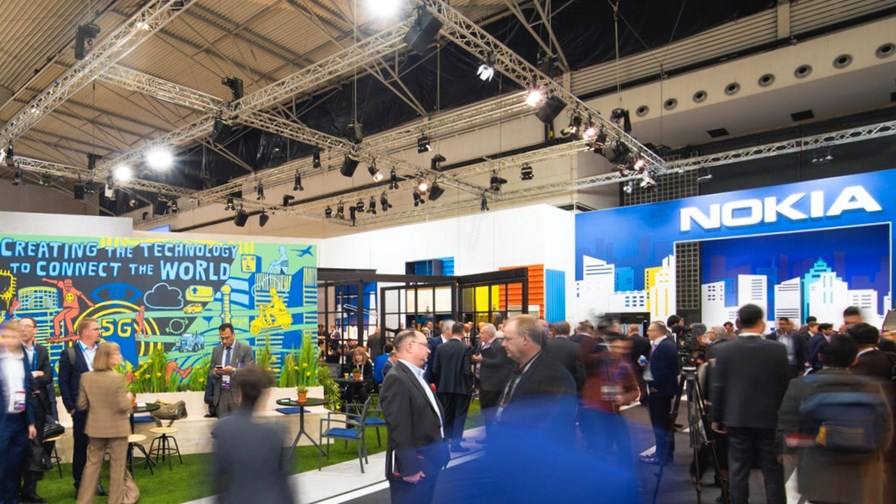
Nokia at MWC19 (picture courtesy of Nokia)
- Nokia has joined the Open RAN Policy Coalition
- Focus is very much on strengthening the role of the U.S. in 5G and beyond
- The link to the U.S. Federal Government raises questions
Nokia has joined the Open RAN Policy Coalition, the new industry body of more than 30 companies that plans to “promote policies that will advance the adoption of open and interoperable solutions in the Radio Access Network (RAN) as a means to create innovation, spur competition and expand the supply chain for advanced wireless technologies including 5G.”
So one of the three major suppliers of traditional, ‘closed’ radio access network (RAN) gear has joined a group that’s promoting the development and use of systems based on disaggregated hardware and software elements that are glued together using open protocols and APIs that better enable multi-vendor deployments and reduce operators’ reliance on single vendors.
This may seem counterproductive, but of the three large mobile infrastructure vendors, Nokia has always been the one that has supported Open RAN developments – Ericsson is doing what it can to appear supportive without encouraging its uptake, while Huawei is openly hostile to Open RAN.
In the ORAN Alliance, Nokia is “co-chairing the workgroups that are defining the Open Fronthaul Interface and the Near Real-time RAN Intelligent Controller (RIC), which will help automate and optimize the network,” it notes.
But that begs the question – why does Nokia feel compelled to join this new Coalition if it is already actively encouraging the development and use of Open RAN technology through the ORAN Alliance?
The answer appears to be linked to the current geopolitical struggles that are causing a schism in the global telecoms technology sector: The U.S. believes it doesn’t have as much say as it would like in the development of the global 5G technology market and it wants to redress that.
The Open RAN Policy Coalition is offering a way to do that: It is tied closely to the U.S. government and the focus appears to be all about fostering a U.S. (rather than international) telecoms R&D sector. The Executive Director of the coalition is Diane Rinaldo, whose day job is Deputy Assistant Secretary for Communications and Information at the National Telecommunications and Information Administration (NTIA), part of the US Department of Commerce, and the Coalition states very clearly that it believes the “U.S. Federal Government has an important role to play in facilitating and fostering an open, diverse and secure supply chain for advanced wireless technologies, including 5G.”
This U.S. focus comes across in Nokia’s statement too: “Nokia believes that policymakers, operators and equipment providers should work together to support research and development of emerging network technologies that include open systems, advanced 5G technologies and foundational 6G research, with policies that support a robust ecosystem of trusted suppliers that will create a strong U.S. position in secure wireless technology,” noted Brian Hendricks, VP of Government Relations Americas, Nokia, in the company's announcement.
Is this the right way to develop one of the most important areas of development in the telecoms sector? The U.S. Federal Government is, by its nature, partisan and, currently very antagonistic to certain elements of the global telecoms R&D sector. What if a Brazilian, or Portuguese, or South African company came up with a great idea for the development of Open RAN architectures – would they be expected to make a commitment specifically to the U.S. market, or even open facilities in the U.S., to be a part of any Coalition initiatives?
Nokia doesn’t face any difficulties here: It may be a Finnish company, but remember it has a lot of Lucent in its blood and that its Bell Labs R&D assets are headquartered in New Jersey.
For the record, the other members are Airspan, Altiostar, AT&T, AWS, Cisco, CommScope, Dell, DISH Network, Facebook, Fujitsu, Google, IBM, Intel, Juniper Networks, Mavenir, Microsoft, NEC Corporation, NewEdge Signal Solutions, NTT, Oracle, Parallel Wireless, Qualcomm, Rakuten Mobile, Samsung Electronics America, Telefónica, US Ignite, Verizon, VMWare, Vodafone, World Wide Technology, and XCOM-Labs. Yes, there’s an international mix, but the non-U.S. companies appear to be either network operators that want to see any Open RAN developments accelerated so they can advance their strategies or companies with the scale to play a role in the U.S. market.
Let’s hope we get more clarity on what the Coalition is hoping to achieve and what the end results might be: Open RAN developments will have a role of some sort to play in 5G and likely 6G, but it should be a global effort, not one that is tied to any one country or the largesse of any particular government.
- Ray Le Maistre, Editorial Director, TelecomTV
Email Newsletters
Sign up to receive TelecomTV's top news and videos, plus exclusive subscriber-only content direct to your inbox.




